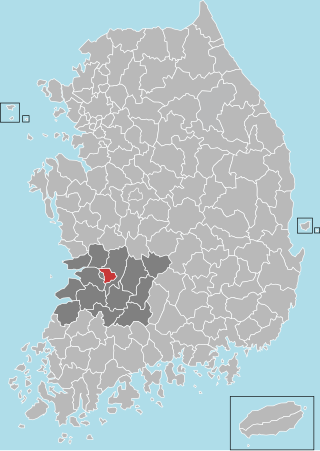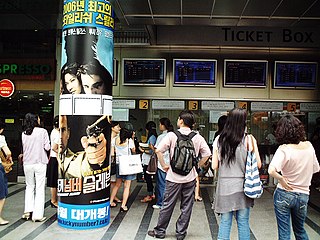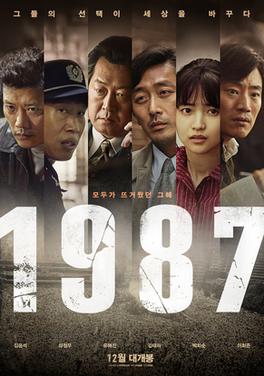| Lists of South Korean films by year |
|---|
 |
| Korean Animation |
A list of films produced in South Korea in 1987:
| Lists of South Korean films by year |
|---|
 |
| Korean Animation |
A list of films produced in South Korea in 1987:

Jeonju is the capital and largest city of Jeollabuk-do, South Korea. It is both urban and rural due to the closeness of Wanju County which almost entirely surrounds Jeonju. It is an important tourist center famous for Korean food, historic buildings, sports activities, and innovative festivals.

South Korean films have been heavily influenced by such events and forces as the Korea under Japanese rule, the Korean War, government censorship, the business sector, globalization, and the democratization of South Korea.

Kang Soo-yeon was a South Korean actress. An internationally acclaimed star from the mid-1980s to the end of the 1990s, she is often honorifically nicknamed Korea's "first world star".

Jung is a Latin alphabet rendition of the Korean family name "정", also often spelled Jeong, Chung, Joung or Jong. As of the South Korean census of 2015, there were 2,407,601 people by this name in South Korea or 4.84% of the population. The Korean family name "정" is mainly derived from three homophonous hanja. 鄭 (2,151,879), 丁 (243,803) and 程 (11,683). The rest of the homophonous hanjas include: 政 (139), 桯 (41), 定 (29), 正 (22) and 情 (5).
This is a list of films by year produced in the country of South Korea which came into existence officially in September 1948. The lists of Korean films are divided by period for political reasons. For earlier films of united Korea see List of Korean films of 1919–1948. For the films of North Korea see List of North Korean films. For an A-Z list of films see Category:Korean films.
Running Man may refer to:

Bangladesh–South Korea relations refer to the diplomatic and bilateral relations between the countries of Bangladesh and South Korea. In 1974, South Korea opened its embassy in the capital Dhaka, with the latter nation opening its embassy in 1987.

Shin Seong-il was a South Korean actor, film director, producer, and former politician. A legendary actor with 500 films in over 40 years, Shin debuted in director Shin Sang-ok's 1960 film A Romantic Papa and rose to fame through popular youth titles. A star in the 1960s and 1970s, his status as one of Korea's top actors extended well into the 1980s.

Yoon Jeong-hee was a South Korean actress and beauty pageant titleholder who competed at Miss Korea 1964. She debuted in 1967 in Theatre of Youth. She appeared in about 330 films, and her better known works are New Place (1979), Woman in Crisis (1987) and Manmubang (1994). Her last performance was in 2010, in director Lee Chang-dong's film Poetry, for which she won 7 best actress awards including Asia Pacific Screen Award for Best Actress at 4th Asia Pacific Screen Awards, the Grand Bell Award at 47th Grand Bell Awards, and Los Angeles Film Critics Association Award at 2011 Los Angeles Film Critics Association Awards.
Kim Ji-mee is a South Korean actress, producer, and film planner whose activity began in 1957. She was born in Daedeok, South Chungcheong province, Korea in 1940. While a student of Deokseong Girls' High School, Kim was cast to Kim Ki-young's film, Hwanghon yeolcha (황혼열차) in 1957. Kim has been commonly dubbed "Elizabeth Taylor of Korea" by the South Korean news media for her resemblance with the American actress' appearance and popularity as well as her many marriages and divorces.

Park Hee-soon is a South Korean actor. He graduated with a Theater degree from Seoul Institute of the Arts, and was a member of the Mokwha Repertory Company from 1990 to 2001. He became active in film beginning 2002, and won several Best Supporting Actor awards for his portrayal of a tough cop in Seven Days (2007). He received further acting recognitions for his roles in the films The Scam (2009) and 1987: When the Day Comes (2017). Apart from his film career, Park starred in television series All About My Romance (2013), The Missing (2015), Beautiful World (2019), and My Name (2021), the lattermost of which brought him international attention.

Kim Yoon-seok is a South Korean actor, film director and screenwriter. Kim began his career in theater and it subsequently led him to be cast in minor roles in films and television dramas. His breakout role came as the villain in gambling film Tazza: The High Rollers (2006), but it was his performance as an ex-cop turned pimp in surprise hit The Chaser (2008) that brought him acting awards and wider recognition.
Lee Hye-young is a South Korean actress. She is the daughter of celebrated film director Lee Man-hee, who died in 1975 when she was in middle school. Lee began her acting career in 1981 at the age of 18 through a local musical theatre production of The Sound of Music. Since then she has performed in theater, feature and short films, and television. She was one of the most prominent South Korean actresses in the 1980s, starring in films such as The Blazing Sun (1985), Winter Wanderer (1986), Ticket (1986), The Age of Success (1988), North Korean Partisan in South Korea (1990), Fly High Run Far (1991), Passage to Buddha (1993), and No Blood No Tears (2002). Lee also played supporting roles in the Korean dramas I'm Sorry, I Love You (2004), Fashion 70's (2005) and Boys Over Flowers (2009).
The Korean Association of Film Critics Awards (Korean: 한국영화평론가협회상), also known as the Critics Choice Awards, is an annual awards ceremony for excellence in film in South Korea. It was established in 1980 by the Korean Association of Film Critics (KAFC). The ceremony is usually held in November or December.

Cine21 is a South Korean film magazine published by The Hankyoreh newspaper. The magazine was first published on 24 April 1995 in Seoul, and subsequent issues have continued to be released weekly.

Kim Tae-ri is a South Korean actress. She is known for starring in the films The Handmaiden (2016), Little Forest (2018), and Space Sweepers (2020), as well as the television series Mr. Sunshine (2018), Twenty-Five Twenty-One (2022), and Revenant (2023). Her role in Twenty-Five Twenty-One won her the Best Actress Award for Television at the 58th Baeksang Arts Awards.

1987: When the Day Comes is a 2017 South Korean political thriller film directed by Jang Joon-hwan and written by Kim Kyung-chan. The film stars Kim Yoon-seok, Ha Jung-woo, Yoo Hae-jin, Kim Tae-ri, Park Hee-soon and Lee Hee-joon. Set in 1987 and based on a true story, the film focuses on the events that led up to the June Democratic Uprising in Korea, triggered by the death of a student protester during police interrogation which the authorities conspired to cover up. Jang compared the overall structure of the film to a relay race, with the focus of the story shifting between several characters to convey the collective effort of political resistance. The film was released in theaters on December 27, 2017.
Ha is a Latin alphabet rendition of the Korean family name "하", also often spelled Hah or less commonly as Har. As of the South Korean census of 2000, there were 213,758 people by this name in South Korea, or roughly 0.5% of the population.
The 54th Baeksang Arts Awards ceremony was held on May 3, 2018, at Hall D, COEX in Seoul. Hosted by Shin Dong-yup, Bae Suzy and Park Bo-gum, it was broadcast live on JTBC. Organised by Ilgan Sports and JTBC Plus, it is South Korea's only awards ceremony which recognises excellence in both film and television.
Kim Tae-seong is a South Korean film and television composer. His credits include the films Crossing (2008), War of the Arrows (2011), The Admiral: Roaring Currents (2014), 1987: When the Day Comes (2017), Extreme Job (2019), Space Sweepers (2021), The Roundup (2022) and the television series Emergency Couple (2014), Squad 38 (2016), Bad Guys 2 (2017), The Guest (2018) and My Liberation Notes (2022).